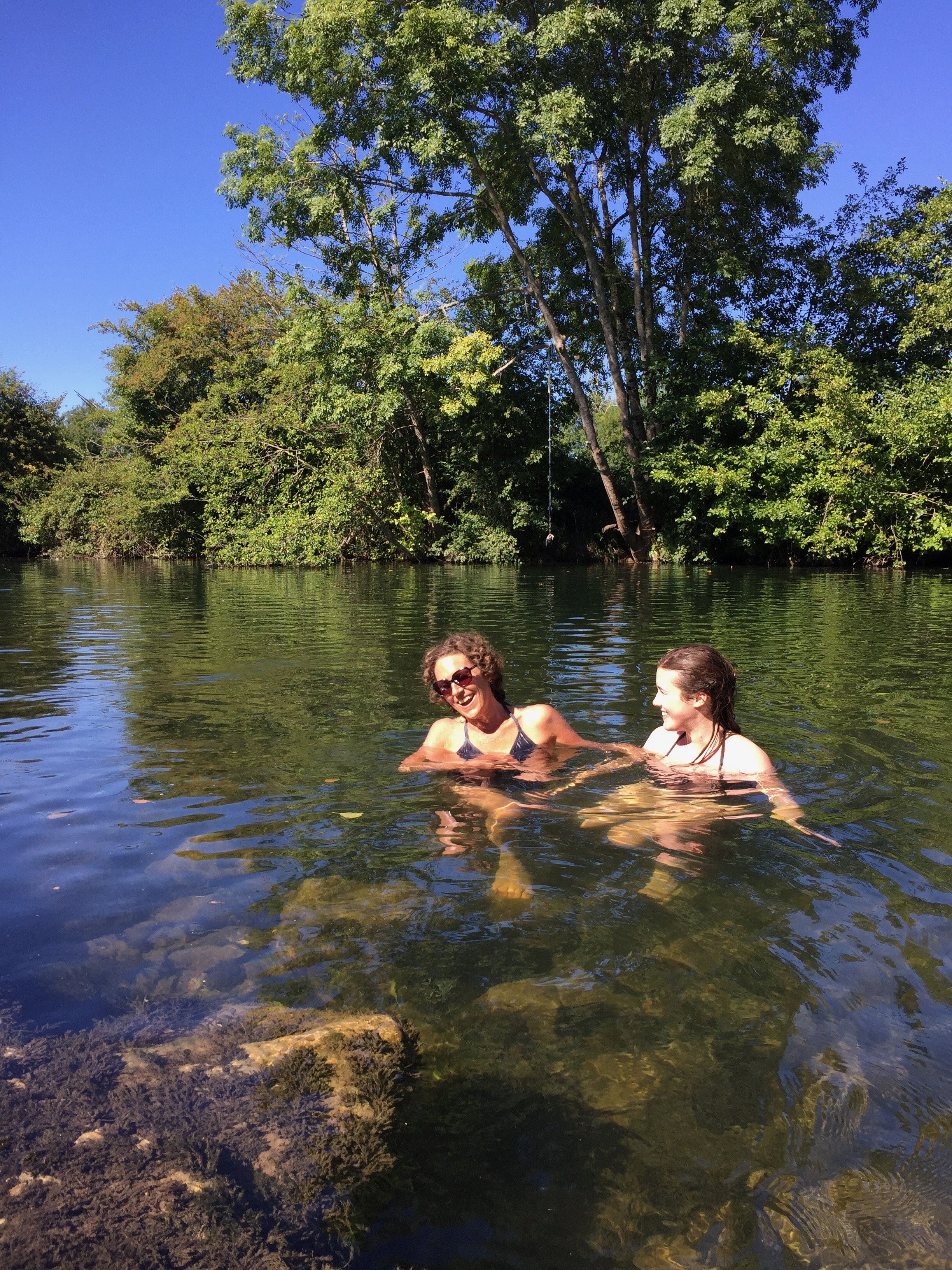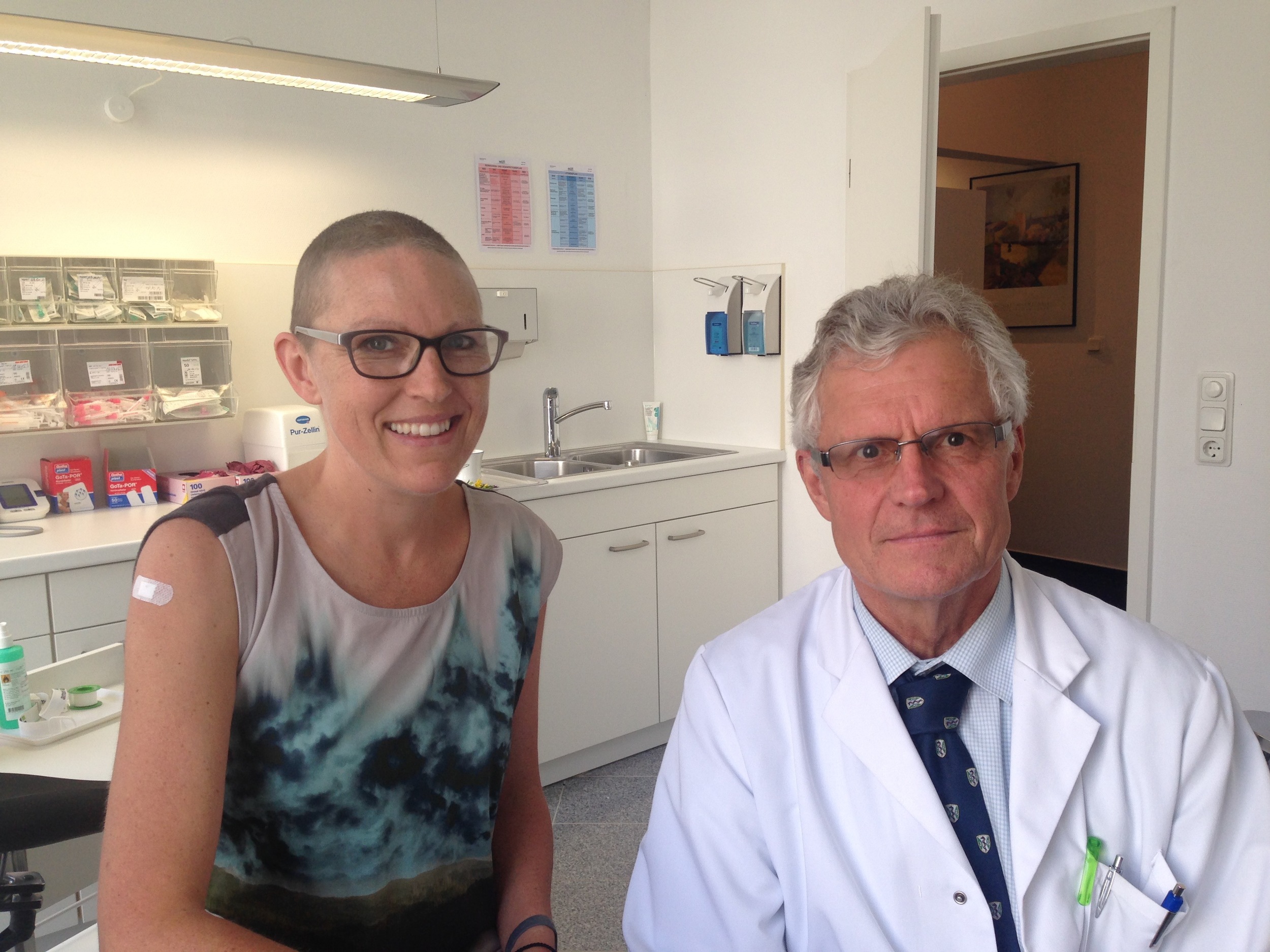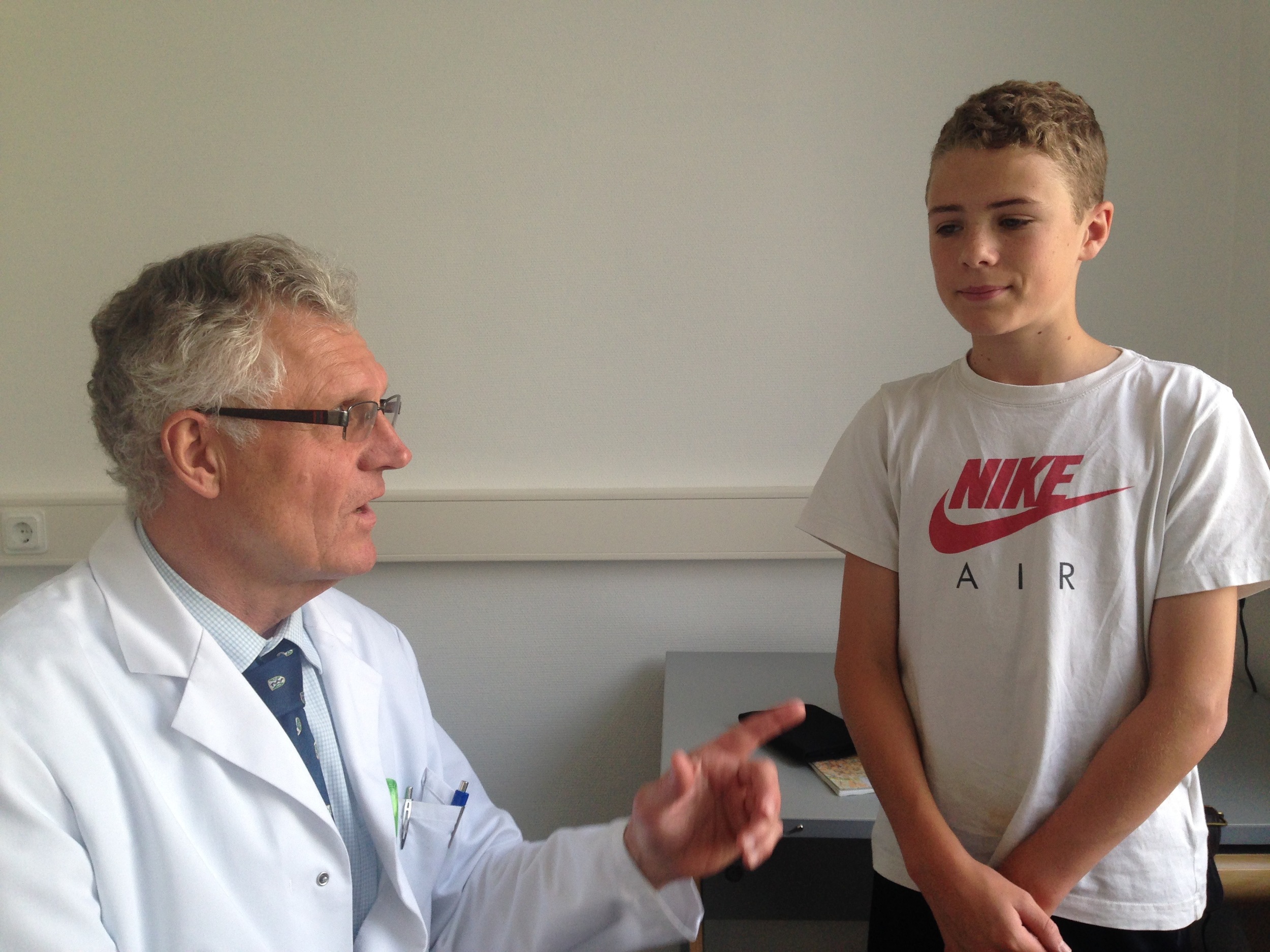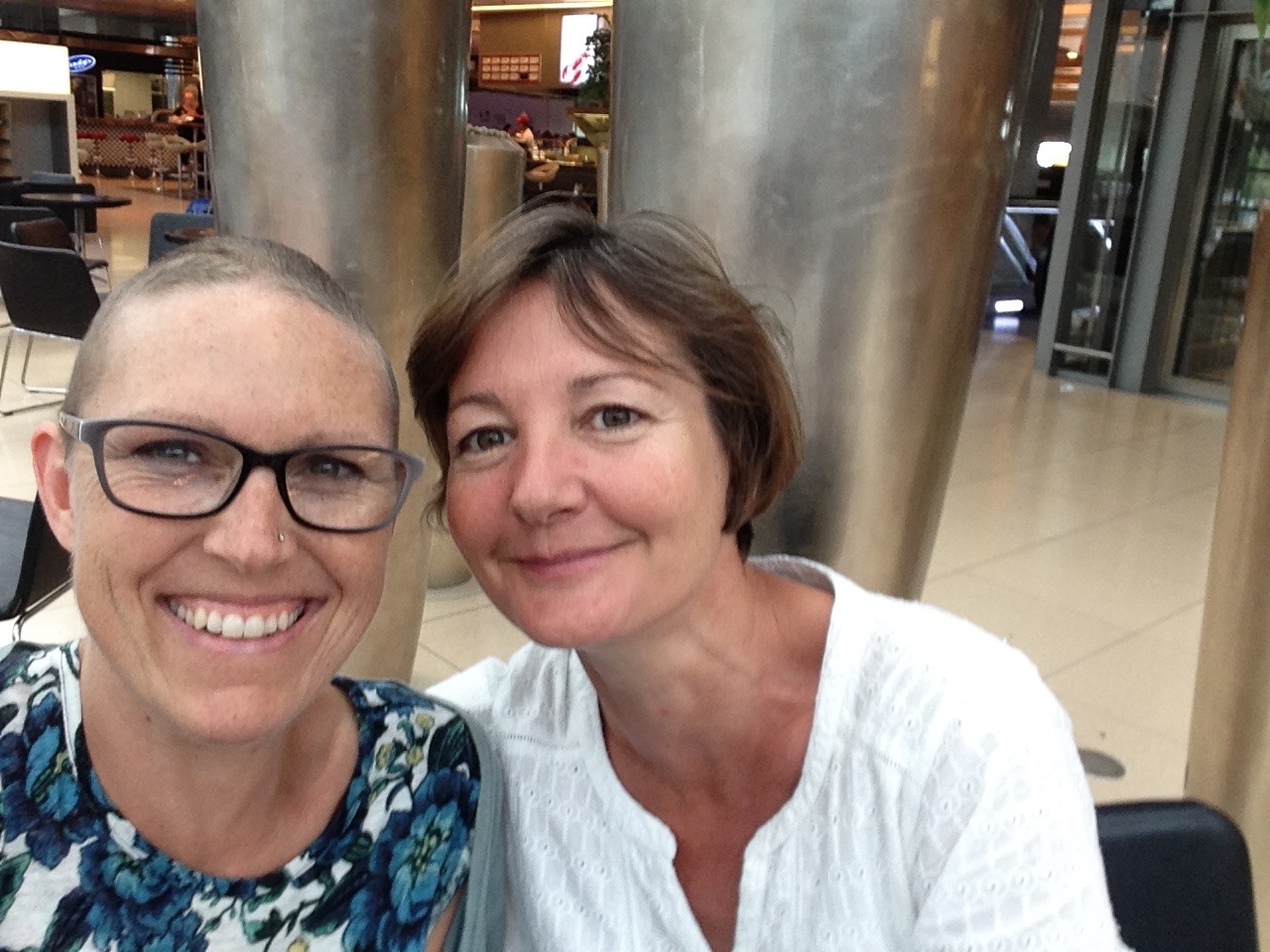Dendritic cell round two, examination of the larynx and spinal chords
/It is now almost a week since my return from my second visit to Gottingen for my second dendritic cell injection. I travelled with a friend Paula, who helped keep the show on the road, made sure I had my morning juice and supplements and generally took control in the post injection window when I lie on my bed with a fever for a good few hours.
This time I also took William, my 14 year old. He is the only one of my children to learn German and this was a good experience for him. More importantly I am trying to carve out special time with each of the children to give them all one on one Mum time as I consciously lay down memories. This was a good opportunity for William time.
I was also from a family of four and I remember the only time I really ever got time alone with my Mum was in the car when she was ferrying me somewhere, to a doctors appointment or the dentist. I had traintracks on my top teeth for 6 months of my life and that meant a few Mum trips to the orthodontist. My most concentrated Mum time ever happened at the age of 7 or 8. We were living in Saudi Arabia and I suffered terrible ear problems. My ear drum would burst all the time leaving gunk all over my hair and pillow in the mornings until I was flown to Cyprus for an operation to remove my adenoids. This was the nearest military hospital (my father was a Royal Engineer in the army for much of his career). The joy of the trip was that I went alone with my mother. As I could not fly soon after the operation we had 2 full weeks together. Mum hired the cheapest vehicle she could which turned out to be a small minibus with a missing window pane and we would do day trips, driving around the hairpin beds with the plastic sheeting covering the missing pane flapping frantically as we explored the island.
For this latest trip to Germany we landed in Hamburg and took a taxi to the central station to catch our train to Gottingen. On the way back we discovered the cheaper rail route from the airport to the station which is pretty straightforward (unless you have a suitcase as large as I did the first time I visited). This time we stayed in Hotel Central on what looked like the quiet Judenstrasse. No lift, and our room was on the top floor. In the height of summer this meant that our room could get hot so we had to leave the windows wide open. Which let in all the noise. At night the quiet Judenstrasse was anything but quiet. The sleepy looking bar opposite was clearly a popular night spot, music, singing, laughing and general hilarity way into the early hours. Then just as that settled down the trucks began. Perhaps it was the acoustics of the street but it sounded like a constant stream of tanks rolling up and down the road through to getting up time. We liked the hotel though, they were friendly and helpful and it was really well located, close to Dr Martin’s clinic and to the town centre.
William walked around with a go pro filming a vlog (video log) which we will try and link to (we have a way to go in our vlogging technique). I went to the clinic 3 times, on the Thursday, Friday and Saturday morning. On the Thursday and Friday I had the infusions they use to support the Dendritic Cell Therapy (including Zometa and Newcastle Disease Virus) plus hyperthermia treatment each morning. On the Friday at about 12.30 I had my second injection. This time there were 64 million dendritic cells. Followed by the interferon to stimulate a fever (which peaked at 39.2 degrees and lasted around 8 hours in total). Dr Martin and his partners use a blood test which examines the circulating tumour load as part of their assessment of DC therapy. I have since read that this is in fact considered a more effective prognostic test compared with imaging. Those with circulating tumour load of less than 5 do better than above 5, very simply and the lower the better. My load last time I came in June was 9.3, which is pretty high I think. This time it had reduced to 6.6. Still above 5 but this is a clear decline. So Dr Martin, using this and my other blood results and my well being, said this was better than he would have expected. This news buoyed me and made me feel very positive. I am home now, feeling fit and well and ready for a lovely summer with my family.
When I got home I had an appointment with an ENT specialist to investigate something the PET scan had shown up in the space behind my nose. This involved having a very long thin camera being stuck down my nostrils. As they were just looking at the area directly behind the nose they did not need to use the full length of this piece of equipment. The official name of this procedure was an endoscopic examination of the larynx and pharynx. As the back of the throat and nose are are covered with rapidly dividing cells and the PET scan picks these up so there are frequently followup investigations from PET scans where other anomalies are identified which are often nothing but need follow up. It was nothing in my case. I had not felt worried, until perhaps a minute or two before in the waiting room, but that waiting room feeling is inescapable. The procedure was only a little uncomfortable and it was all over pretty soon.
Earlier this week I caught some of an interview with Melanie Reid, the journalist who writes a weekly column in the Times ‘Spinal Column’. (Listen to the interview on iPlayer). I have occasionally read this column. Her spine was crushed falling from a horse and the column charts, among other things, the physical and emotional challenges of everyday life and the impact of her accident on friends and family. I was fascinated to hear her. Her voice is strong and were you to hear her talking about some other subject you would have no idea what she has to manage to simply survive everyday. The frustrations and constant reliance on others.
Her words had a significance I would never in my previous life have anticipated. The accident was 4.5 years ago and she admits to still not being reconciled to her fate, not accepting. With that I differ, even though it has been only a short time really since my diagnosis of advanced cancer I really have had 5 years to at least conceive that my life may not end as an old lady eating scones and cream with my best friend. Even though I had a good ‘prognosis’ (whatever that is) when I was first treated the possibility that I could be one of those for whom cancer came back was always in the back of my mind. I remember the first time I was diagnosed, early on in the process when I was unclear of how serious it was, I found myself with tears in my eyes as I watched the pretty banal and everyday scene of an old woman sitting on a train, looking elegant and reading her paper, maybe on a trip to visit her grandchildren, and all I could think was ‘please let me grow old, please let me grow old’. Not something I would normally have wished for as the creases of age began to show on my then 40 year old face.
Over the years, after that diagnosis, these thoughts subsided. They are back. My earlier blog explored sudden death vs diagnosis of terminal cancer with time to spare. Listening to Melanie made me think about the loss of control and independence that would come with a spinal injury resulting in almost total paralysis. This strong woman spoke of the friends who provided her an incredible support network. She also spoke of the impact on her children and how she was determined that her disability would not become theirs. She has a son who is studying in New Zealand, and she made it clear that she wanted them to live their lives and not have to stay close to look after her in any way. Then her voice broke and what she said resonated so powerfully, not only I am sure with me but with any mother who finds herself in a similar situation. She spoke to her son often and wrote to him but did not share her downs with him. She wanted him to remember her as the mother ‘who can do things’. She chokes slightly on these words.
The impact of my diagnosis on my children has helped define my response. I was the mother who managed everything, I am the mother who manages everything as many mothers and fathers do everyday, from knowing where their favourite trousers are, signing the various permission slips that they pile home with, coordinating logistics to get them to and from clubs or friends houses and on and on. I work and am generally a busy and can do sort of mother. And that is what I want them to remember me as (and to continue to experience me as). I was actually only not very well during the chemotherapy as that made me weak, the cancer so far has made me only a bit tired and given me dried skin and some heart burn (before diagnosis). Now that I am recovering from that chemo and eating and sleeping well and managing stress etc etc I am pretty fit and well. If you didn't know it is hard to believe there is anything wrong with me at all. So I can get firmly back on my pedestal of Mum who can do things.
Emotionally I wonder perhaps if in my determination to make sure the children’s lives and thoughts are not dominated by what is wrong with their mother, I do not allow them to see me emotional about the cancer ever (except Ella). How hard it is as a mother to see your child emotionally struggle knowing there is little you can do about it but love them. Flip this around and imagine what it must do to a child to see their mother emotionally struggle and being unable to make it better. The main result is a household that remains happy and almost normal (except that they are all very good to me and clear up after meals making me sit down, monitoring my juice taking and being sensitive if I look as if I need a rest). I hope the day never comes, but perhaps one day I will be less mobile and more physically dependent and not the mother that can to things. We have a toilet downstairs which has a shower that has never worked since we moved in. We had a plummer around as my relatively new water filter was not working and while she was there (yes! amazing a female plummer and brilliant at that) we asked her to look at the shower to see what it would take to mend it. This involved discussions about the shower tray which at the moment is deep and tricky to get in and out of (and is currently home to lots of redundant shoes). We agreed on a solution which she very diplomatically referred to as ‘future proofing’ which would make access to the shower easy for someone who finds it difficult to walk. Again, I intend to defy the odds but taking sensible precautions is the only sensible thing to do. It still offers a window to the horror or what could be. A horror which I do not dwell on and intend to never experience but know that it is the lot of many many advanced cancer patients at one stage in their journey.
I am for now grateful for my health today. That I can get myself out of bed, make my own cup of tea (green of course), go to the toilet alone, walk to the shops, catch a train, walk the dogs, go on holiday. I am not confined as Melanie is to the reality of the everyday effort and dependance to simply eat and generally survive. I know that if that were me, I would work on a different type of survival strategy as I am sure Melanie does, to make the very best of such a situation - but goodness it must be hard.
The other type of condition I have thought about is alzheimers. Early onset alzheimers. I am yet to see ‘Still Alice’ but have heard about it and have also recently spoken to someone about a friend of theirs who was diagnosed at 54 after a year of friends thinking she was just becoming a bit flaky until she started forgetting things like paying the rent. Knowing you are losing your mind, your memories, yourself. Is that like death? For the family it has the same effect but worse as there is still the body to care for. I do not morbidly dwell on these things but they have such a different significance for me. I cannot help but consider my lot with other everyday tragedies which affect people and their loved ones so profoundly and from this reinforce to myself what is positive about what I have.
We leave for a week in Mallorca on Monday and later to France. Spoiling time together, hopefully with the sun. Perfect for immune boosting activity. I return to Germany early September and between then and now have no significant medical appointments (except my monthly injection to keep me in chemically induced menopause).











